- Home
- Helen Peters
An Otter Called Pebble Page 2
An Otter Called Pebble Read online
Page 2
Jasmine changed quickly and hurried to the scullery. The sleeping otter was lying in the scale pan while Tom wrote its weight on a notepad.
“Can you tell us if it’s a boy or a girl?” asked Jasmine, as she took a new syringe and a sachet of rehydration formula from the cupboard.
Nadia lifted the cub off the scales, turned it on to its back and examined it.
“It’s a female,” she said.
“A girl,” said Jasmine. “What shall we call her?”
“While you’re thinking about that, I’ll give her a quick health check,” said Mum, “and you can get the formula ready. That water in the kettle should be about the right temperature.”
Jasmine tipped the contents of the sachet into a measuring jug. Then she poured in the correct amount of cooled boiled water, and whisked the solution to dissolve the powder.
Nadia laid the otter on an old towel on the work surface, parting sections of fur to look at the skin.
“No wounds or bite marks,” she said. “So she wasn’t attacked.”
“I can’t believe how thick her fur is,” said Jasmine.
“It keeps them warm in cold water,” said Mum. “Otters have two different layers of fur: a short fluffy underfur, for warmth, and a longer waterproof overfur, to keep them dry. But they’re not waterproof until about ten weeks, and I would guess this one’s younger than that. So it would be able to float, but not swim yet. Their mothers teach them to swim once their fur is waterproof.”
“So if we hadn’t rescued her, she’d have drowned,” said Jasmine.
“Yes. Thank goodness you were there.”
She examined each of the cub’s big paws in turn.
“Oh, she’s got webbed feet!” said Tom.
“Sharp claws, too,” said Jasmine.
Nadia turned her attention to the cub’s ears. “Otters have special flaps on their ears and nose,” she said, “so they can close them when they swim underwater. And their eyes work as well underwater as they do on land.”
She gently prised the cub’s mouth open.
“Look, her teeth are beginning to come through. So I would guess she’s still feeding mainly on her mother’s milk, but also starting to eat fish.”
“Should we give her fish?” asked Jasmine.
“For the moment, she just needs the rehydration formula. Is that the right temperature, Jasmine?”
Jasmine filled the syringe and dropped a little formula on to her wrist. The liquid felt the same temperature as her skin.
“It feels right to me,” she said. “What do you think?”
Nadia held out her wrist and Jasmine dripped some formula on it.
“Perfect,” she said.
“Can me and Tom feed her?” asked Jasmine.
“As long as you can get the fluid into her mouth properly. It’s really important that it gets into her.”
“I’ll hold her,” said Tom, “while you feed her.”
They sat at the kitchen table and Nadia placed the sleeping otter, wrapped in the towel, on Tom’s lap. Tom prised her jaws apart until Jasmine was able to slip the syringe’s plastic nozzle into her mouth.
“Slow and steady,” said Nadia. “Just dribble it in.”
Jasmine drip-fed the fluid into the cub’s mouth. The otter stayed completely still, her eyes closed.
After a few minutes, Nadia said, “You’re doing a great job. Can you manage while I go and make some phone calls? I need to speak to an otter specialist to find out what to do once she’s rehydrated.”
“Sure,” said Jasmine. “We’ll be fine.”
“I’ll be in my study if you need me,” said Mum.
A few seconds later, she appeared in the doorway again. “By the way,” she said, “otters have a ferocious bite. Even ones as small as this. So if she starts to perk up, don’t put your fingers near her mouth. Try to keep her very calm and quiet.”
She left the room again. For several minutes, Jasmine continued to drip-feed the fluid into the otter’s mouth.
“I wish she’d open her eyes,” she said. “Or twitch her nose, or do anything to show she’s getting better.”
And just then, as if she had heard Jasmine’s wish, the cub lifted her head up. Her eyelids flickered open and her perfectly round, bright black eyes looked straight at Jasmine.
“Oh!” said Jasmine. “She’s better!”
“She’s so cute,” said Tom, smiling as he stroked the otter’s smooth fur.
“You’re beautiful,” said Jasmine to the cub. “I’m so happy you’re better. I was so worried about you.”
“What shall we call her?” said Tom.
Jasmine thought for a minute as she continued to feed the otter. “What about Splash?”
“Hmm,” said Tom. He didn’t sound convinced.
“River?”
“River,” repeated Tom, thoughtfully. “I’m not sure. She’s a bit small to be called a whole river.”
“Stream, then,” said Jasmine. “Or Puddle.”
Tom laughed. Then he said, “I know! What about Pebble? We found her among the pebbles, after all.”
“Pebble,” said Jasmine. “I like that. What do you think, little otter? How would you like to be called Pebble?”
The kitchen door opened and Mum appeared, holding the phone to her ear. Pebble turned towards the sound. Mum’s face lit up in a delighted smile.
“Yes,” she said to the person on the phone. “She’s opened her eyes and started to look around. Yes, isn’t it?”
She mouthed, “Well done,” to the children and left the room again.
“We need to find her family,” said Tom. “Once she’s a bit better, we can go and look for them.”
Jasmine’s eyes lit up. “Imagine finding a whole family of otters!”
“Can you believe this is the first otter cub around here for years and years?” said Tom. “We could be famous. The newspapers might come and take photos. We might be on TV.”
“If she’s an orphan,” said Jasmine, “maybe we can keep her. Do people have pet otters?”
“I don’t know,” said Tom. “I don’t know much about them, actually.”
“Me neither,” said Jasmine. “But we can find out.”
When Mum returned, Pebble was sitting on Jasmine’s lap, looking around curiously. Tom had drawn up a very neat chart on a piece of paper and was filling in her weight, time of feed and amount eaten.
“Oh, well done, you two,” said Nadia. “She looks so much better!”
“Her name is Pebble,” said Jasmine proudly. “What did the otter people say?”
“Well, I phoned Mira at the Wildlife Trust first,” said Mum, “and she was so excited. They didn’t think there were any breeding otters in Sussex. You’re quite the local heroes.”
“Will we be on TV?” asked Tom.
Mum laughed. “Definitely not, I’m afraid.”
“Why not?” asked Jasmine, offended. “We’d be great on TV.”
“I’m sure you would,” said Mum, “but they don’t want us to tell anyone about Pebble.”
“Why not?” asked Tom.
“Well, imagine if you went on local television or radio and said you’d found an otter cub on this farm. What do you think would happen?”
“Loads of people would come here looking for otters?” said Tom.
“Yes, that’s one thing. And otters are very shy. The last thing we want is to scare them away.”
“What’s the other thing?” asked Jasmine.
“Well,” said Mum, “unfortunately, some people don’t like otters.”
“Don’t like them? How could anybody not like otters?”
“Some fishermen don’t like them because otters eat the fish they want to catch,” said Mum. “It’s hard to believe, but it was legal to hunt otters in this country until quite recently. That’s one of the reasons why they almost became extinct.”
“So if people knew there were otters here, they might come and hunt them?” asked Tom, horrified.
“It’s possible,” said Mum. “So there won’t be any TV cameras here.”
“What else did they say?” asked Jasmine.
“Well, they were concerned, of course, that this cub has been separated from her family. They said you’d done the right thing to wait and see if the mother came back. Once the cubs are this age, the mother moves them between different holts, and she carries them one at a time, so she leaves one and comes back for it. That call you heard is called a whistle. Cubs and mothers communicate by whistling to each other.”
“So Pebble was calling for her mother?”
“Probably,” said Mum. “But since you waited a long time and the mother didn’t return, then she might not have been moving her cubs. It’s possible that the holt was flooded and Pebble was swept downstream.”
“What did they say about looking after her?” asked Jasmine.
“They gave me the number of an otter specialist at Hemsley Wildlife Park, where they rehabilitate a lot of cubs. He was very pleased to hear that Pebble’s already perking up, and he said to continue rehydrating her for twenty-four hours.”
“And then do we start giving her milk?” asked Jasmine. “Or fish?”
“From what I told him about Pebble’s weight and teeth, he reckons she’s about eight weeks old,” said Mum. “So they’ll start her on a sort of fish soup, which is fish blended with milk.”
“Wait a minute,” said Jasmine. “What do you mean, ‘they’?”
Nadia took a deep breath.
“Otters need expert care, Jasmine. Neil – that’s the man I spoke to – said Pebble should be at a specialist centre where she can live with other otters.”
Jasmine gaped in outrage. “What? No! We’re looking after her. We’re the ones who found her, not this Neil person.”
“Otters aren’t pets,” said Mum. “They have to be handled properly and kept in the right conditions so they can be released back into the wild eventually. You want her to go back into the wild, don’t you?”
“Of course,” said Jasmine. “But we can look after her until then. We don’t need some person called Neil butting in and taking her away from us.”
“It’s really important that she gets the right care as soon as possible,” said Mum. “I don’t just mean looking after her,” she continued, as Jasmine opened her mouth to protest. “I know you and Tom are brilliant at looking after baby animals. But we don’t want Pebble to imprint on you, do we?”
Jasmine knew about imprinting. If a baby animal is fed and handled by a human, it will think that person is its mother. And that means it will never be able to live in the wild again.
“Neil said she should go to a centre as soon as possible,” said Mum, “so she can be with other otters and revert to her normal behaviour. The keepers at the wildlife park are too busy to fetch her themselves, so someone from the local Wildlife Rescue is coming to take her to the wildlife park tomorrow morning.”
“Tomorrow?! No!” exclaimed Jasmine.
Pebble raised her head and squeaked in alarm.
“Sorry, Pebble,” said Jasmine guiltily, stroking the back of the otter’s sleek head.
“The sooner the better,” said Mum, “if they’re going to have the chance of rehabilitating her effectively.”
“But then we’ll hardly have any time with her.”
“You’ve got until tomorrow morning,” said Mum, “which is longer than most people ever have with an otter. Just think how lucky you are. The first otter cub to be spotted here in forty years, and you get to look after her for a whole night.”
Jasmine said nothing. She couldn’t believe they were going to have to say goodbye to Pebble so soon after finding her.
“I know it’s hard,” said Mum, “but you have to remember that she’s not yours. She’s a wild creature and she belongs with others of her own kind. You’ve done an amazing job. She would almost certainly have died today if you and Tom hadn’t rescued her. But you want the best for her, don’t you? And I’m afraid that in this case, the best thing is to let her go.”
Jasmine was always prepared to argue her case until she exhausted her parents into submission. But, deep down, she knew it wouldn’t be right to turn Pebble into a pet. She belonged in the wild, with other otters.
“At least you’re sleeping over,” she said to Tom. “We can do her night feeds.”
Tom was staying at Jasmine’s until Tuesday, while his parents were at a wedding. Tom hadn’t been invited, for which he was very thankful.
“Pebble won’t need night feeds,” said Nadia. “You can feed her at ten, and then get up at six for the early morning feed. And that’s final,” she said, as Jasmine opened her mouth to argue.
“What should she sleep in?” asked Tom.
“Neil said a big box lined with towels. Not cardboard, though, because she might try to chew through it.”
“Sky’s puppy crate?” Jasmine suggested. Sky was Jasmine’s sheepdog.
“Good idea,” said Mum. “Cover it with blankets. She’ll be much calmer and less stressed in a dark place.”
“It can go in my bedroom,” said Jasmine.
Mum laughed. “With you and Tom chatting half the night? She needs peace and quiet.”
“We’ll be really quiet,” Jasmine protested.
“No,” said Mum. “You have to think about what’s best for Pebble. She can go in Ella’s room.”
Ella was Jasmine’s seventeen-year-old sister, and she was staying with a friend for the weekend.
Jasmine held Pebble while Mum and Tom carried the puppy crate up to Ella’s room. Tom fetched a pile of old towels from the scullery and spread them over the floor of the crate.
“I’ll make a hot water bottle in case she needs extra warmth,” said Mum. “And Neil said they give the cubs a toy otter to keep them company.”
Jasmine frowned in thought. She didn’t have a toy otter.
“What about your toy cat?” asked Tom.
“Coco?” asked Jasmine.
“She’s the same sort of colour and shape as an otter, and she’s soft and furry.”
“She might get ruined, though,” said Mum. “I can put her in the washing machine afterwards, but she may never be the same again.”
Jasmine stroked Pebble lovingly. “Coco won’t mind,” she said. “She’ll be honoured to keep Pebble company.”
“Put Pebble in the crate with her now, then,” said Mum. “We should avoid handling Pebble as much as possible from now on, so she doesn’t imprint.”
Jasmine carried Pebble upstairs and carefully placed her in her new bed, while Tom closed the curtains. Pebble snuggled up next to the toy cat and closed her eyes.
“Oh, look,” whispered Tom. “She likes Coco.”
“You’re our otter tonight, Pebble,” Jasmine murmured, as they draped blankets over the crate. “We’re going to look after you. And tomorrow we’ll find your home, so you can go back to your family.”
As they ate their dinner at the kitchen table, Jasmine told her dad all about their exciting afternoon.
“I can’t believe there are otters on this farm,” he said. “That’s fantastic.”
“Amazing, isn’t it?” said Mum.
“Where have you put the baby otter?” asked her little brother Manu. “I want to see it.”
“You’re not allowed anywhere near her,” said Jasmine. “She needs peace and quiet.”
“We’ll be very quiet,” said Manu. He turned to his friend. “Won’t we, Ben?”
“Oh, my goodness, Manu, your hands are shocking,” said Mum. “Go and wash them.”
Ben slid his hands under the table.
“I already washed them,” said Manu.
“Wash them again, please. You too, Ben. And use the nailbrush. Your fingernails are full of dirt. What have you been doing?”
“We’re digging for treasure,” said Manu as he and Ben went over to the sink.
“With your hands?”
“The earth’s really soft. And you can feel
stuff better with your hands.”
“We’re looking for Roman remains,” said Ben.
“Did you find any?” asked Dad.
“We’re not sure,” said Manu. “We found some stuff that might be Roman. We’re going to look again after dinner.”
“I wonder where the holt is,” said Dad.
“What’s a holt?” asked Manu.
“An otter’s home,” said Mum. “Which reminds me, Jasmine. The Wildlife Trust people are keen to reunite Pebble with her family if possible. If the landowners give permission, they’re planning to look along the riverbanks tomorrow, on our land and on the neighbouring farms where the river runs through them.”
“But we’re going to do that,” said Jasmine. “It’s our farm and we’re the ones who found Pebble.”
“You can look as well,” said Mum. “There’s a lot of riverbank, and it’s not a competition.”
Oh, yes, it is, thought Jasmine.
“We’ll find it first,” Tom whispered.
“Anyway,” said Mum, “you should be warned that, according to Neil, it’s extremely unlikely we’ll ever find Pebble’s family.”
“Oh, well, Neil would say that, wouldn’t he?” said Jasmine. “He just wants to keep Pebble for himself.”
Mum gave her a stern look.
“Jasmine, just listen, please, before you take a dislike to somebody you’ve never met. Neil has been rehabilitating otters for years, so he knows what he’s talking about.”
Jasmine made a face, but she said nothing.
“It’s very unlikely that you’d see an actual otter,” said Mum. “They’re highly solitary, and they rarely come out during the day. You can look for tracks and signs, but it’s still very difficult to locate the family, because the mother moves her cubs around a lot. Her territory might be fourteen kilometres of river, and the river only goes through our land for a few kilometres.”
“So they might not even be on this farm,” said Tom, looking worried. “But what will happen to Pebble if we don’t find them?”

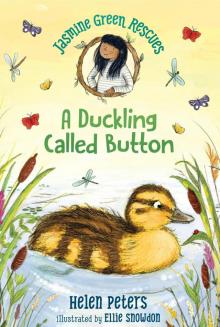 Jasmine Green Rescues A Duckling Called Button
Jasmine Green Rescues A Duckling Called Button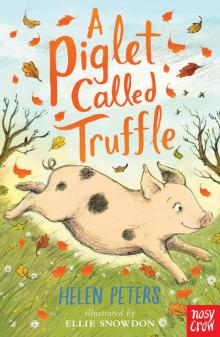 A Piglet Called Truffle
A Piglet Called Truffle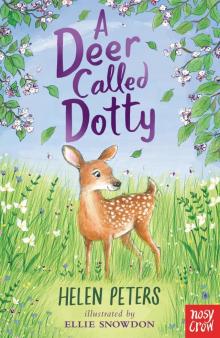 A Deer Called Dotty
A Deer Called Dotty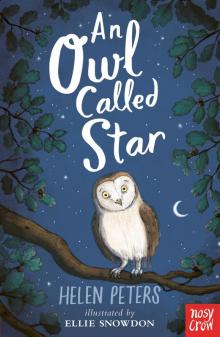 An Owl Called Star
An Owl Called Star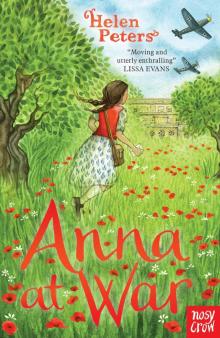 Anna At War
Anna At War The Secret Hen House Theatre
The Secret Hen House Theatre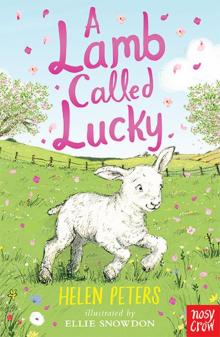 A Lamb Called Lucky
A Lamb Called Lucky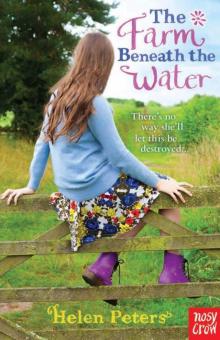 The Farm Beneath the Water
The Farm Beneath the Water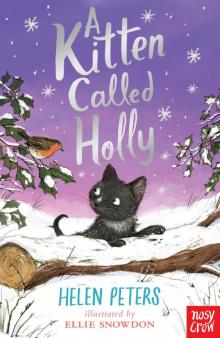 A Kitten Called Holly
A Kitten Called Holly Evie's Ghost
Evie's Ghost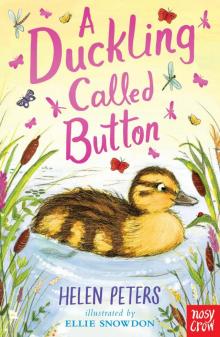 A Duckling Called Button
A Duckling Called Button